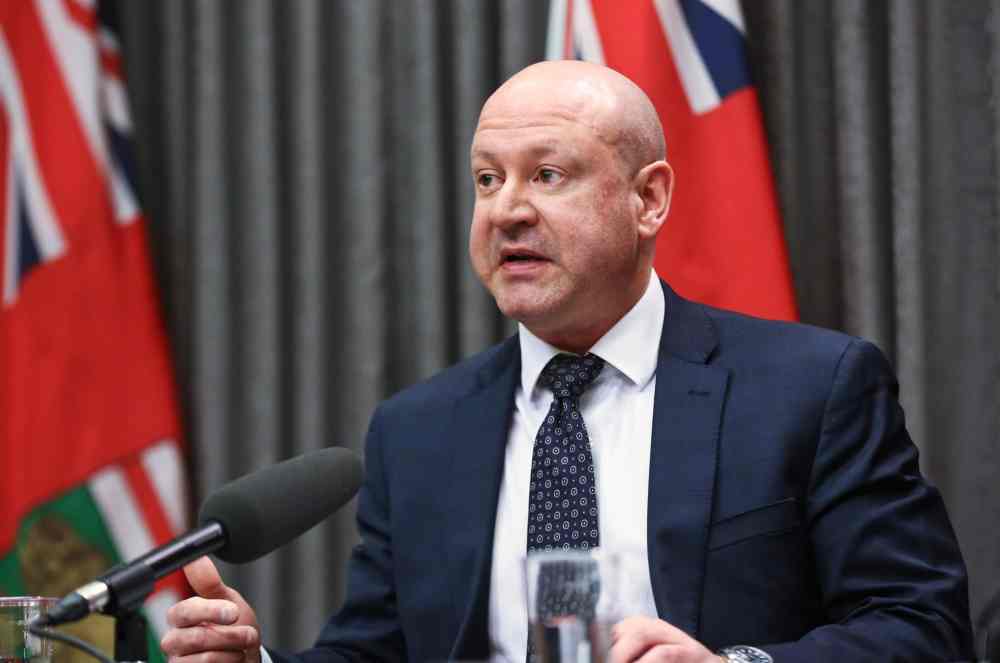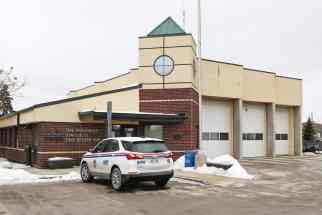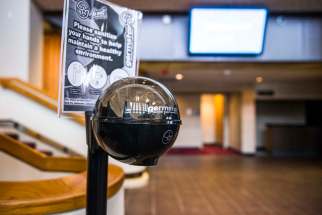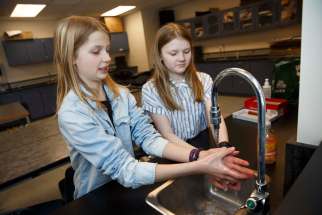Manitoba announces first three cases of COVID-19
Read this article for free:
or
Already have an account? Log in here »
To continue reading, please subscribe:
Monthly Digital Subscription
$0 for the first 4 weeks*
- Enjoy unlimited reading on winnipegfreepress.com
- Read the E-Edition, our digital replica newspaper
- Access News Break, our award-winning app
- Play interactive puzzles
*No charge for 4 weeks then price increases to the regular rate of $19.00 plus GST every four weeks. Offer available to new and qualified returning subscribers only. Cancel any time.
Monthly Digital Subscription
$4.75/week*
- Enjoy unlimited reading on winnipegfreepress.com
- Read the E-Edition, our digital replica newspaper
- Access News Break, our award-winning app
- Play interactive puzzles
*Billed as $19 plus GST every four weeks. Cancel any time.
To continue reading, please subscribe:
Add Free Press access to your Brandon Sun subscription for only an additional
$1 for the first 4 weeks*
*Your next subscription payment will increase by $1.00 and you will be charged $16.99 plus GST for four weeks. After four weeks, your payment will increase to $23.99 plus GST every four weeks.
Read unlimited articles for free today:
or
Already have an account? Log in here »
Hey there, time traveller!
This article was published 12/03/2020 (2108 days ago), so information in it may no longer be current.
The province’s first three presumptive COVID-19 cases were reported Thursday, as testing for the disease ramps up in Manitoba.
The novel coronavirus is “on the move and rapidly progressing,” Health Minister Cameron Friesen said Thursday morning at a hastily-called news conference at the Manitoba Legislative Building.
Hours after announcing the province’s first presumptive case of coronavirus, two more cases in the Winnipeg Regional Health Authority area were reported. Two men, both in their 30s, were apparently “exposed to the virus through recent travel,” a Manitoba Health bulletin said.

Test times
The Cadham Provincial Laboratory tests take 24 hours from the time a lab sample is received and accepted.
For example, if Cadham received the sample on Tuesday at 6 p.m., and was accepted by the lab at 8:30 a.m. Wednesday, the test results wouldn’t be ready until 8:30 a.m. Thursday, a provincial government spokeswoman said.
The provincial lab is open seven days a week.
If the test is positive, confirmation from the National Microbiology Laboratory in Winnipeg is expected to be available within 24 hours after the sample is received, a Health Canada spokeswoman said.
Manitoba’s first case involves a Winnipeg woman in her 40s, who recently travelled to the Philippines.
Public health officials advised passengers on certain airline flights March 7-8 may have been exposed to COVID-19:
— Philippines Airlines Flight PR466 to Incheon, South Korea, from Manila: rows 48 to 54;
— Air Canada Flight AC0064 to Vancouver International Airport from Incheon: rows 30 to 36;
— Air Canada Flight AC8624 to Winnipeg from Vancouver: rows 24 to 29.
“People who may have been on these flights in the rows indicated… are asked to self-isolate and monitor themselves for symptoms for 14 days since their last known contact or exposure,” a Manitoba Health news release said.
If someone develops a fever higher than 38 C (100.4 F), cough, shortness of breath, difficulty breathing, or any other symptoms at any time during the 14-day period, they should call Health Links–Info Santé at 204-788-8200 or 1-888-315-9257 (toll-free), or 911 if it is an emergency. Be sure to advise health officials about travel and/or exposure history.
In announcing Manitoba’s first COVID-19 case, Friesen said the health-care system followed all “proper protocols and took all necessary precautions to ensure the safety of all involved, including the patient, staff and other patients.”
“At this time, all public-health protocol related to contact tracing are being observed. Health officials are in regular contact with the patient,” he said. “I can report that the individual is at home in isolation and in stable condition.”
The woman had a positive COVID-19 test result from the Cadham Provincial Laboratory, and her samples were sent to the National Microbiology Laboratory in Winnipeg for additional work. “That testing will take approximately 24 hours,” Friesen said.
Chief Provincial Public Health Officer Dr. Brent Roussin said the woman had been back in Canada for “a few days,” and was self-isolating at home after being tested. Health officials were notified Thursday morning she had tested presumptive positive.
On Wednesday, the World Health Organization declared COVID-19 to be a global pandemic and the Canadian government announced it was putting $1 billion into the virus fight.
On Thursday, Manitoba’s health minister wanted to allay public fears as testing ramps up and more cases of COVID-19 are identified.
“The vast majority of people who contract COVID-19 will experience mild to moderate symptoms and they will recover,” Friesen said. The risk of severe outcomes is greatest for people over 65 years of age and people with underlying medical conditions and/or compromised immune systems, provincial officials said.
Manitoba has had time to prepare, said Friesen. Earlier this week, Manitoba approved $35.2 million in funding to purchase personal protective equipment, and became the first province to join a national consortium in a bulk purchase of gloves, masks, respirators, gowns and sanitizers.
Friesen and Roussin told Manitobans to get armed with solid information, protect themselves and each other — and buck up. They repeatedly urged Manitobans to observe frequent handwashing and social distancing, coughing and sneezing into their sleeves, to avoid shaking hands, and to stay home when sick.
They advised the public to avoid close, prolonged contact with crowds — within two metres of someone for more than 10 minutes — and to self-monitor if they’re not feeling well, and self-isolate if they’re tested for COVID-19 and waiting for results.
“All Manitobans have a role to play,” said Roussin. “If you are going to attend a large, crowded event, consider that — especially if you’re at a high risk.”
As of Wednesday, 403 tests had been completed for the virus in Manitoba. Earlier this week, there were 40 tests conducted per day; that’s now been ramped up to 500 per day, Friesen said.
Two screening locations in Winnipeg have been set up for those who’ve been directed for COVID-19 testing by Health Links: Access Winnipeg West and Access Fort Garry.
More screening sites will be added soon, with plans being made for locations outside the city, Shared Health chief nursing officer Lanette Siragusa said Thursday. Those who require screening after-hours will be directed to urgent-care sites and emergency departments.
“It’s very important for the public to understand that testing is for symptomatic patients only,” Siragusa said. “Those individuals who may have been exposed to COVID-19, but who are are not displaying symptoms, should not visit health-care sites unless it’s absolutely necessary.”
If they do develop symptoms, they need to contact Health Links—Info Santé to “ensure patients go to the right place and sites are ready and have the necessary precautions in place,” the nursing chief said.

The health-care system is “scaling up resources” over the next few days, with more staff being brought in to handle the high volume of calls at Health Links, said Siragusa.
“We ask for Manitobans’ patience as we address this issue,” she said, calling it an “unprecedented public health challenge.”
Manitoba Liberal MLA Jon Gerrard (River Heights) said during question period Thursday concerned constituents have complained they couldn’t get through to Health Links, and were getting a busy signal all afternoon.
“Health Links—Info Santé is understandably experiencing very high call volumes at the moment, with longer-than-usual wait times,” Shared Health said in a statement. “A mitigation plan to address the higher-than-normal call volumes is being implemented.”
Siragusa said a “robust system response” is underway across Manitoba, with more front-line health-care staff being recruited and another 20 ventilators on order, in case they’re needed.
Friesen thanked health-care officials co-ordinating and leading the COVID-19 response and workers on the front lines and behind the scenes. “We have been well-served,” he said.
Manitoba’s first presumptive positive case of COVID-19 was not unexpected, said Roussin.
“The system was prepared to rapidly identify the first case and to rapidly isolate and eliminate the possibility of further spread,” the doctor said. “We are not helpless against this virus… Fear and panic will not help against COVID-19 but preparation and credible information will.”
The chief public health officer said employers also have a role to play.
“Employers should review their business continuity plans and ensure their employees can stay home when ill without facing unnecessary burden, such as the requirement for sick notes,” said Roussin.
Allowing people to work from home when they’re not ill is another step employers could take, he said, as well as cancelling all non-essential work-related travel outside Manitoba, and holding virtual meetings online rather than gathering in close quarters for a prolonged period.
All travellers need to beware, said Roussin.
“Things are changing quite rapidly,” he said. “Do you have plans for what you would do if you or a family member became ill while away? What would you do if you had to be quarantined while away?”
Concerns about COVID-19 overshadowed concerns about the 2020 budget that was supposed to be delivered this week at the Manitoba legislature.
On Thursday — after the Opposition again used legislative tactics to delay tabling of the budget — Premier Brian Pallister accused the NDP of “playing on the fears of people.”
“At times like these, you don’t play to peoples fears,” Pallister told reporters. “That’s what the NDP is doing by stoking fear around our budget.
“It’s an excellent budget (and) they’ve deprived Manitobans of the the opportunity to see it.”
NDP Leader Wab Kinew said delaying the budget has nothing to do with stoking COVID-19 fears and everything to do with a healthy democracy.
“Nothing that we do today impacts the government’s ability to respond to COVID-19,” Kinew said. “On Tuesday, we enabled $35 million to purchase masks, gowns, gloves and sanitizer to help the province prepare for COVID-19.
“We are doing our work as Opposition after having taken care of those responsibilities.”
larry.kusch@freepress.mb.ca
carol.sanders@freepress.mb.ca


Our newsroom depends on a growing audience of readers to power our journalism. If you are not a paid reader, please consider becoming a subscriber.
Our newsroom depends on its audience of readers to power our journalism. Thank you for your support.
History
Updated on Thursday, March 12, 2020 12:34 PM CDT: Adds video
Updated on Thursday, March 12, 2020 6:07 PM CDT: Updates number of cases
Updated on Thursday, March 12, 2020 7:21 PM CDT: Full write through














